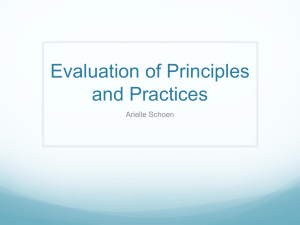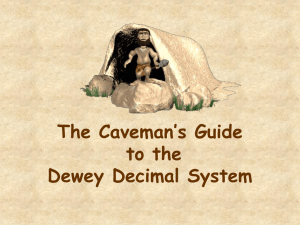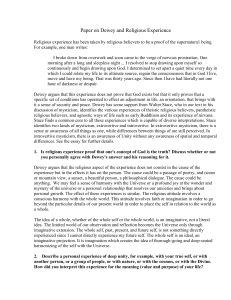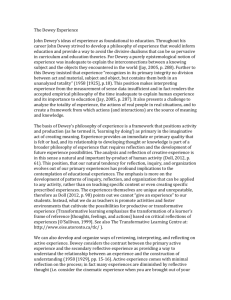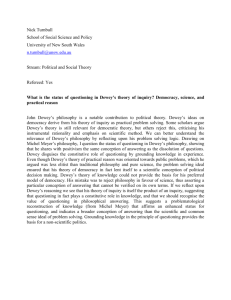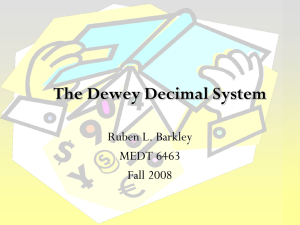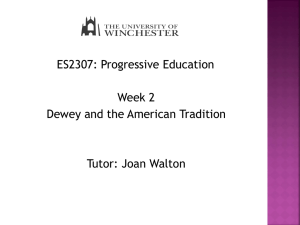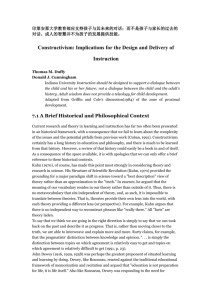Dewey or Do We Not (PowerPoint)
advertisement
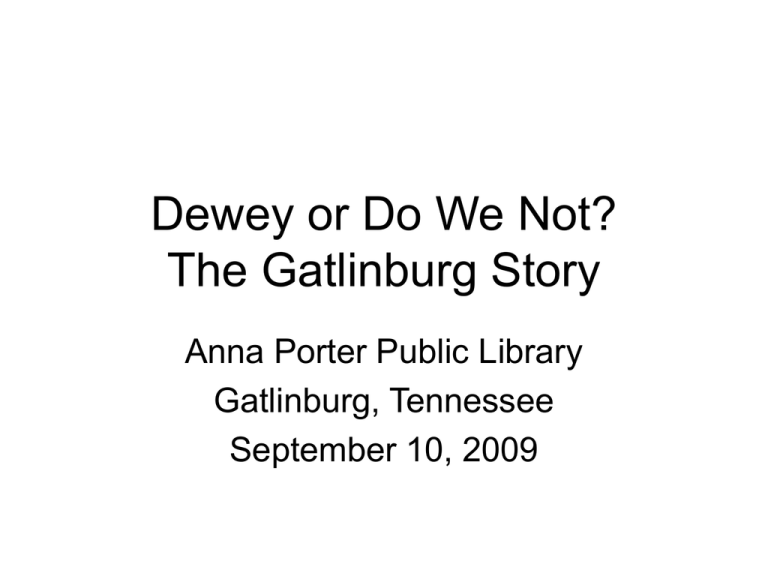
Dewey or Do We Not? The Gatlinburg Story Anna Porter Public Library Gatlinburg, Tennessee September 10, 2009 Actually, We Dew But first who are we? • APPL is a 501( c ) 3 • “To provide library services to the City of Gatlinburg” • • • • • 6 employees 20,000 items 8,000 square feet $208,000 annual budget $ 18,700 materials • • • • Population = 5,000 97% are Caucasian 20% are over 65 yrs. 56% students on Federal Free & Reduced Lunch program • Seasonally = 35,000 • Economy = Tourism The Idea and the Timeline 2005 and 2006: • Exposed to “merchandised” libraries in Columbus, Ohio at ARSL • Visited Columbus to collect subject categories 2007 and 2008: • Weeded & shifted the collection into new “bookstore” groups • Re-cataloged and “stickered” the books 2009 • Moved into new building in March “Merchandising” • • • • • • • • Excellent Signage Fronts out – 17% Displays Do not use the top or bottom of traditional shelving Use lower shelves Traffic moves to the right Add pleasant scents - cinnamon, apples, coffee, lemon, orange Music, maybe? Read Chris Rippel’s “What Libraries Can Learn from Bookstores” http://www.webjunction.org/marketing Making The Decision • Choose your classification system (Dewey, BISAC whatever) • • • • • • Evaluate the Circ-Cat system Evaluate the space Renovation? Expansion? New building? Consider the size of your collection. Know who will make the changes Know who will pay for the signs Evaluate the cataloger Important Considerations • Weed Weed Weed…..and Weed… • Displays are crucial, and take time • Each new book’s cataloging must be evaluated per the collection What To Do First • • • • • • • Placement Classification system Subject categories Circulation/Cataloging software Stickers? Conversion method/personpower Add signage Old Building Subject Placement Decisions • Use new subject categories • Where is available space and what category should go there? • What’s big to leave where it is? Ans: Fiction • What’s little and can move first? Ans:400s • What moves next after a space opens up? And so forth…. APPL Actions • Fiction stayed on 1 side • Juv & Teen material stayed on 1 side • Science and Sports moved to the Juv side New Building Subject Placement Decisions 1. Available space 1. Smoky Mountain Collection 2. Teen Corner 2. Bookstore placement concepts 1. 2. 3. 4. People move to the right Adjacent subjects in 3 visited bookstores Vague 001 – 900 Dewey concept Available Space – leftovers…. Classification Systems • Dewey • • 641.59519=Cooking,Korean=COOKING Allows for finer more specific shelf placement • OSC (Open Shelves Classification) • • • • “a free, humble, modern, open-source, crowd-sourced replacement for the DDS A collaborative effort by LibraryThing members Coordinated by the founder of LibraryThing, & two librarians, one at the Pratt Institute www.librarything.com/groups/buildtheopenshelvesc • BISAC (Book Industry Standards • • • and Communication) The basis for WordThink COOKING/RegionalEthnicAsian or Cooking International Books alphabetized by title within each area Classification System • • • • Choices Dewey Modified Dewey BISAC WordThink Modified Dewey because • No wheel re-invention • Dewey allows specificity. Ex. Transportation • Based on Dewey (DDC20) • Books come with cataloging • Could switch back if it’s a flop Circulation/Cataloging Software • Must have a field for Shelf Location • Apollo by Biblionix Spine Labels • Leave the Dewey number/author’s last name spine labels the same • Add subject stickers for each subject category. • Why? Easier re-shelving Subject Stickers Conversion Method/Personpower Direct Conversion • Ex. 800s • We used computer literate volunteers 1. 2. 3. 4. Difficult Conversions • Ex. 300s & 600s • I did it Pull books Add Subject Category to catalog record Put in new place Have volunteers add the subject stickers. Summary • • • • • • • • Who we are How we came to do this Timeline for the conversion and the new building Issues on which the decision was based Considerations not to forget Where to start? Shift what to where? How categories were developed Shifted and stickered the collection in the old building
